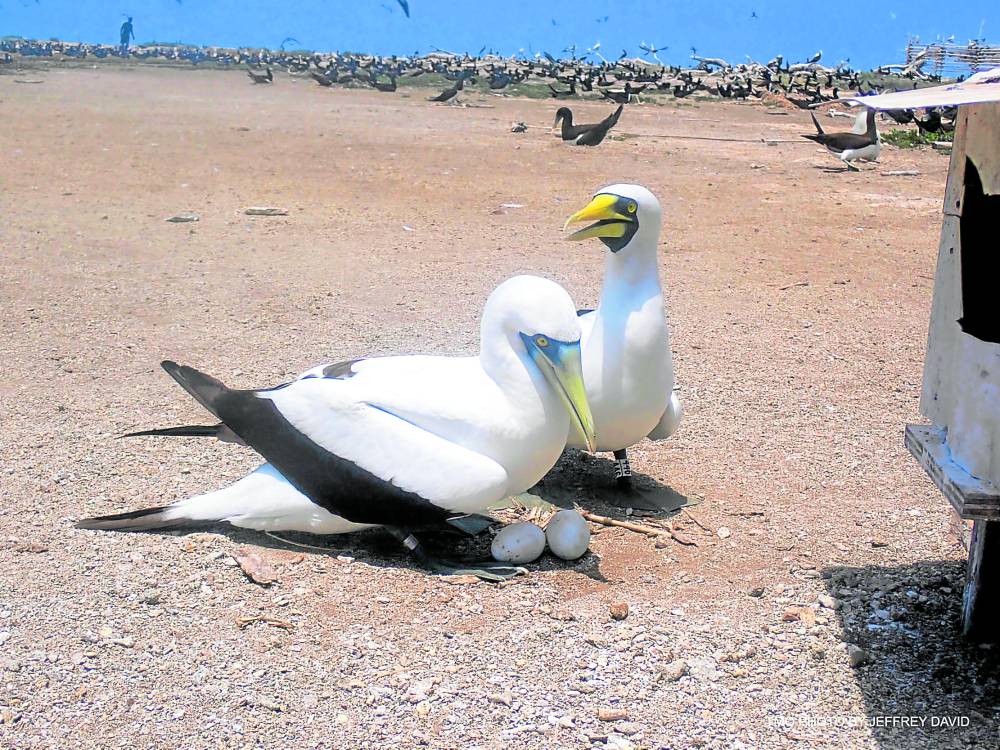In Tubbataha, family of masked boobies growing with 2 new eggs

PARENTAL DUTY The pair of masked boobies named “Amihan” and “Alon” watch over their new eggs on the Bird Islet at Tubbataha Reefs in Palawan on Thursday, March 30, 2023. The bird, which reappeared at Tubattaha in 2016 after 20 years, lays one or two eggs four times a year, rangers at the national park say. —PHOTO COURTESY OF TUBBATAHA REEFS NATURAL PARK MANAGEMENT
A pair of masked boobies (Sula dactylatra) produced two eggs on the Bird Islet at Tubbataha Reefs in Palawan.
PUERTO PRINCESA CITY — A pair of masked boobies (Sula dactylatra) produced two eggs on Thursday, raising hopes that efforts to increase the population of the bird, which reappeared at the Tubbataha Reefs Natural Park (TRNP) seven years ago, are paying off.
According to the management of TRNP, park rangers have been monitoring “Amihan” and “Alon” at the Bird Islet in the north atoll of the park since they were first spotted there. The birds got their names—Filipino terms for northeast monsoon and wave, respectively—following an online poll conducted by TRNP last year.
“We have some ‘egg-citing’ news to share with you all. Our beloved masked booby family has expanded once again, this time with the addition of some freshly laid eggs,” the TRNP said in a post on its official Facebook page.
“It seems that Alon and Amihan have been busy during their downtime, and we couldn’t be more thrilled about it. Seeing our feathered friends grow their family and perpetuate the species is such a joy,” it added.
READ: Unseen in PH for years, masked boobies start family in Tubbataha
In July 2022, Amihan successfully hatched her first chick.
The bird was deemed extinct until it reappeared on the islet back in 2016, after around 20 years since it was last seen.
Raising more
The masked booby, also called the masked gannet or the blue-faced booby, is a large seabird with a long, pointed yellowish bill, a long neck, an aerodynamic body, long, slender wings, and a pointed tail.
The adult booby is bright white with black wings, a black tail and a dark “face mask.”
They nest in colonies on islands and atolls far from the mainland and close to deep water required for foraging.
Amid declining populations, the masked booby is still considered a “least concern species” by the International Union for Conservation of Nature.The TRNP said its target is to raise the number of masked boobies in Tubbataha to 150.
As of now, there are only three masked boobies in Tubbataha: Amihan, Alon and their first baby, a female that park rangers named “Roxana,” hatched last year.
“The masked boobies in Tubbataha lay one or two eggs on average four times a year. Since 2020, the bird in the islet has laid eggs nine times,” Retch Alaba, TRNP research officer, told the Inquirer in a phone interview on Thursday.
According to Alaba, the first seven were, however, unsuccessful. The first six eggs did not hatch while the seventh egg hatched, but the juvenile bird died after five months.
The masked booby eggs undergo an incubation period of 38 to 45 days.
Reserve
Tubbataha Reef lies in the middle of the Sulu Sea, some 50 kilometers southeast of this city.
According to the website of the United Nations Educational, Scientific and Cultural Organization (Unesco), the TRNP covers 96,828 hectares, including the North and South Atolls and the Jessie Beazley Reef.
“It is a unique example of an atoll reef with a very high density of marine species; the North Islet serves as a nesting site for birds and marine turtles. The site is an excellent example of a pristine coral reef with a spectacular 100-meter perpendicular wall, extensive lagoons and two coral islands,” Unesco said.
READ: PCG installs radios at Tubbataha Reefs Natural Park in a bid to stop poaching
The TRNP, according to Unesco, is home to a great diversity of marine life, including whales, dolphins, sharks, turtles and Napoleon wrasse.
The reserve supports over 360 species of coral and almost 700 species of fish. It also protects one of the few remaining colonies of breeding seabirds in the area.